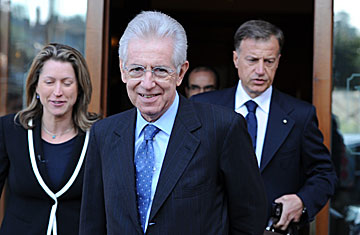
Former EU commissioner Mario Monti leaves his hotel on November 13, 2011 in Rome. Italy readied a new government on Sunday after the momentous resignation of Prime Minister Silvio Berlusconi, with former European Union commissioner Mario Monti tipped to take over amid a debt crisis.
Silvio Berlusconi's last public act as prime minister of Italy was to drive through a crowd of protesters who were yelling "buffoon" and "shame" at him. The streets outside the presidential palace pulsated with chanting demonstrators, waving Italian flags and popping champagne bottles as the 75-year-old media tycoon met with Italy's president to tender his resignation. In one corner, a choir sang "Hallelujah," accompanied by an impromptu orchestra. In another, celebrants formed a conga line. Cars honked their horns and pedestrians broke into song. That night, to avoid being mobbed, the politician who so loved the spotlight was forced to leave by the side door.
Scandal-ridden, populist, extravagant, Berlusconi is expected to be replaced by a man who couldn't be more dissimilar. Mario Monti, 68, a neo-liberal economist and former commissioner at the European Union, is the ultimate technocrat, calm, elegant, even a little boring. "The man is the most un-Berlusconiesque person you can think of," says Beppe Severgnini, author of Mamma Mia!: Berlusconi's Italy Explained to Posterity and Friends Abroad. "He's like clean water after you've been drinking too much."
For many in Italy, Monti is just the man to clean up after what many in the country see as a couple of lost decades, years in which mismanagement of the economy caused public debt to climb even as growth slowed to a crawl. "Berlusconi desperately needs to be loved, by voters, by everybody," says Severgnini. "In order to be popular, he was ready to do anything, to spend his way into high approval ratings. In this financial situation, that's a recipe for disaster." Monti, by contrast, is almost an anti-politician. His steady demeanor, mastery of the global banking system, and expected independence from the country's disordered political circus are expected to be a salve for the roiling bond markets. As European Commissioner, Monti earned the nickname Super Mario for taking on — and defeating — some of the great business titans of the 20th century, staring down Jack Welch over a proposed merger between General Electric and Honeywell and defeating Bill Gates in a tussle over Microsoft's anti-competitive dominance. "He's willing to stand up against political pressure," says Massimo Motta, a professor at the Barcelona Graduate School of Economics who has studied the two cases. "He's somebody who is able to follow what he thinks is right."
At a time when the Italian electorate is deeply disillusioned by their country's politicians, Monti is seen as something of an outsider, the man from the European Union. The left-wing Italian newspaper La Repubblica praised his "Anglo-Saxon" qualities, and Berlusconi's foreign minister Franco Frattini has commended his "hard work" in Brussels — both qualities, it seems, opposed to traditional "Italian" virtues. "He has an international profile that nobody can deny," Frattini said. And few question his expertise. "Monti has a deep knowledge of how market economies and financial markets work, something that cannot be said of some of his predecessors," says Roberto Perotti, a former student of Monti's and an economist at Milan's Bocconi Universtiy, where Monti has been serving as president. "One problem with Italian prime ministers and politicians in general is that they have virtually no exposure to other experiences, particularly to the Anglo-Saxon world, to how the world of the market economy works."
And yet, Monti doesn't face an easy task. In order to regain, the confidence of the markets, in particular that of Italy's bond holders, whose panic last week sent the cost of servicing Italy's debt surging to crisis levels, he will have to pass legislation that's bound to be deeply unpopular with the Italian electorate. "Sometimes people don't want to listen to the doctor's advice," says Severgnini. "But when they're really in trouble, they go to the emergency room." Even before Monti was sworn in, the sniping had already begun. Berlusconi's political party had spent the weekend deliberating whether or not to give the new government the support it will need to push through reforms in a country where free-market capitalism doesn't have a political constituency. Though the answer was ultimately positive, the decision was quickly undermined Sunday morning by the headlines of Berlusconi-friendly newspapers. "Here comes Mr. Taxes: Watch your Wallet," read one.
Later that day, Italian media reported that Berlusconi had hinted he might run again, writing in a message to a group of hard-right supporters: "I share your spirit and I hope to resume with you the path of government." Monti may not be a politician, but to succeed he will nonetheless require the support the country's political class. "When the moment comes to deciding about cutting pensions or changing labor laws, at that point he is going to need a parliamentary majority, like everybody else," says Perotti. The next few months, he added, will be crucial. "Countries can decline, and Italy is a good candidate for that," he adds. "Monti, I think, is our last chance."
